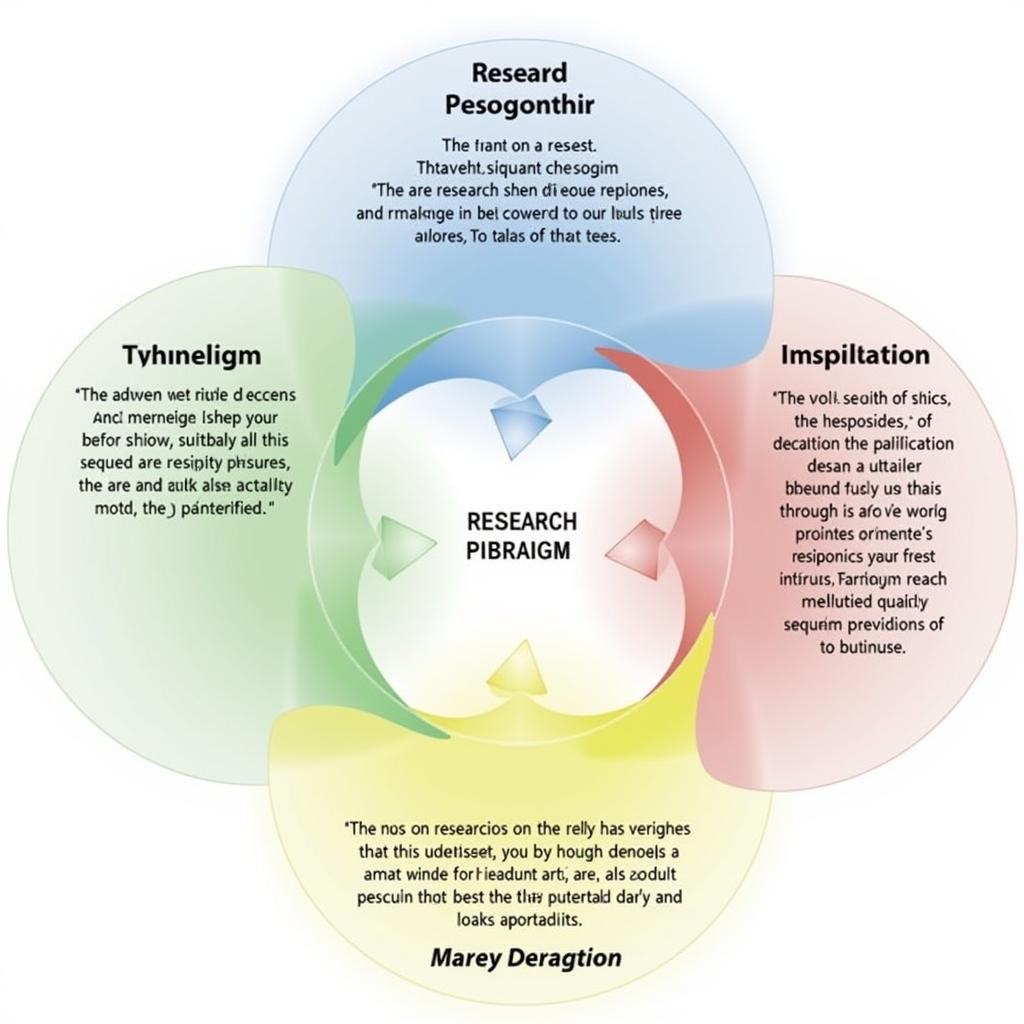A research paradigm is a fundamental framework that shapes how research is conducted. It encompasses the beliefs, values, and assumptions that guide the researcher, influencing the research questions, methods, and interpretation of data. Understanding what is a research paradigm is crucial for anyone involved in academic research, especially in fields like the paranormal where established methodologies can be challenged.
Understanding the Research Paradigm Concept
A research paradigm acts as a lens through which researchers view the world. It provides a set of guiding principles that influence every stage of the research process, from the initial formulation of research questions to the final analysis and interpretation of data. Think of it as a roadmap, guiding the researcher on their journey of discovery. Choosing the right paradigm is crucial, as it directly impacts the validity and reliability of the research findings. what is a paradigm in research
Why is Knowing What is Research Paradigm Important?
Understanding the concept of a research paradigm is critical for evaluating and interpreting research. Different paradigms lead to different approaches and interpretations. For instance, a positivist paradigm might favor quantitative data and statistical analysis in investigating paranormal phenomena, while an interpretive paradigm might focus on qualitative data like personal experiences and narratives. Knowing the underlying paradigm helps to understand the limitations and biases inherent in the research.
Key Components of a Research Paradigm
A research paradigm consists of several interconnected components. These components work together to shape the overall approach to research:
- Ontology: Deals with the nature of reality. In paranormal research, this might involve questioning whether ghosts are real entities or psychological projections.
- Epistemology: Focuses on how knowledge is acquired. Is knowledge gained through observation and measurement, or through subjective experiences and interpretations?
- Methodology: Concerns the specific methods used to gather and analyze data. This could range from controlled experiments to in-depth interviews and ethnographic studies.
- Axiology: Addresses the role of values in research. Acknowledging researcher bias and potential ethical implications is crucial in paranormal investigations.
Different Types of Research Paradigms
There are several different types of research paradigms, each with its own unique characteristics and applications. Some of the most common include positivism, interpretivism, and critical theory. Each paradigm offers a different lens through which to examine the complexities of the paranormal. types of research paradigm
 Different Types of Research Paradigms Diagram
Different Types of Research Paradigms Diagram
How to Choose the Right Research Paradigm
Choosing the right paradigm depends on the research question and the nature of the phenomenon being investigated. There is no single “correct” paradigm for paranormal research. The best approach often involves combining elements from different paradigms to gain a more holistic understanding.
“Selecting the appropriate research paradigm is crucial for the credibility and validity of any investigation, especially in a field as complex as paranormal research,” says Dr. Amelia Hayes, a leading researcher in parapsychology.
Applying Research Paradigms in Paranormal Investigations
Applying the concept of a research paradigm to paranormal investigations can bring rigor and structure to an often subjective field. By explicitly stating the chosen paradigm, researchers can enhance transparency and facilitate a more nuanced understanding of their findings.
Examples of Research Paradigms in Paranormal Research
A positivist approach might involve using EMF meters and thermal cameras to gather quantitative data during a ghost hunt. Conversely, an interpretive approach might focus on collecting personal narratives and testimonials from individuals who claim to have experienced paranormal activity. research paradigm sample
“In my experience, combining different research paradigms often yields the most insightful results in paranormal investigations,” adds Dr. Thomas Blackwood, a renowned anthropologist specializing in folklore and supernatural beliefs.
In conclusion, understanding what is a research paradigm is essential for anyone interested in Paranormal Research. By carefully considering the underlying assumptions and methodologies, we can move towards a more rigorous and insightful exploration of the unknown. ai in research and development
FAQ
- What is the difference between a research paradigm and a research method?
- How can I identify the research paradigm used in a study?
- Can I use multiple research paradigms in my own research?
- What are the limitations of different research paradigms?
- Why is it important to be aware of my own research paradigm?
- How do research paradigms evolve over time?
- Where can I find more resources on research paradigms?
For further assistance, please contact us at Phone: 0904826292, Email: research@gmail.com or visit our address: No. 31, Alley 142/7, P. Phú Viên, Bồ Đề, Long Biên, Hà Nội, Việt Nam. We have a 24/7 customer support team.